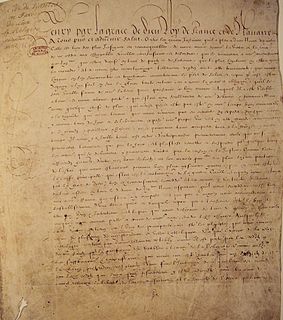
The Edict of Nantes was signed in April 1598 by King Henry IV and granted the Calvinist Protestants of France, also known as Huguenots, substantial rights in the nation, which was in essence completely Catholic. In the edict, Henry aimed primarily to promote civil unity. The edict separated civil from religious unity, treated some Protestants for the first time as more than mere schismatics and heretics and opened a path for secularism and tolerance. In offering a general freedom of conscience to individuals, the edict offered many specific concessions to the Protestants, such as amnesty and the reinstatement of their civil rights, including the right to work in any field, even for the state, and to bring grievances directly to the king. It marked the end of the French Wars of Religion, which had afflicted France during the second half of the 16th century.
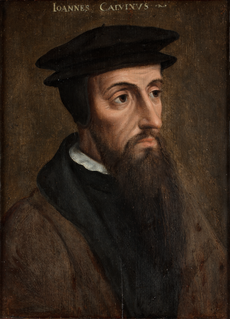
The Huguenots were a religious group of French Protestants who held to the Reformed, or Calvinist, tradition of Protestantism. The term, which may be derived from the name of a Swiss political leader, the Genevan burgomaster Bezanson Hugues, was in common use by the mid-16th century. Huguenot was frequently used in reference to those of the Reformed Church of France from the time of the Protestant Reformation. By contrast, the Protestant populations of eastern France, in Alsace, Moselle, and Montbéliard, were mainly Lutherans.

The Nine Years' War (1688–1697), often called the War of the Grand Alliance or the War of the League of Augsburg, was a conflict between France and a European coalition which mainly included the Holy Roman Empire, the Dutch Republic, England, Spain, Savoy and Portugal. It was fought in Europe and the surrounding seas, in North America, and in India. It is sometimes considered the first global war. The conflict encompassed the Williamite war in Ireland and Jacobite risings in Scotland, where William III and James II struggled for control of England and Ireland, and a campaign in colonial North America between French and English settlers and their respective Native American allies.

Françoise d'Aubigné, known first as Madame Scarron and subsequently as Madame de Maintenon, was a French noblewoman who secretly married King Louis XIV. Although she was never considered queen of France, she was one of the King's closest advisers and the royal children's governess. In 1684, she founded the Maison royale de Saint-Louis, a school for girls from poorer noble families.
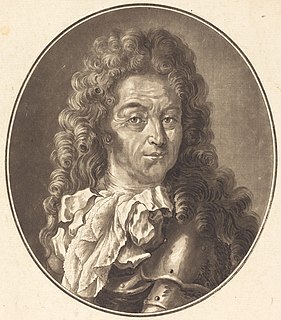
Nicolas Catinat was a French military commander and Marshal of France under Louis XIV. The son of a magistrate, Catinat was born in Paris on 1 September 1637. He entered the Gardes Françaises at an early age and distinguished himself at the Siege of Lille in 1667.

Françoise-Athénaïs de Rochechouart de Mortemart, Marquise of Montespan was the most celebrated maîtresse-en-titre of King Louis XIV, by whom she had seven children.

The Edict of Fontainebleau was an edict issued by French King Louis XIV and is also known as the Revocation of the Edict of Nantes. The Edict of Nantes (1598) had granted Huguenots the right to practice their religion without state persecution. Protestants had lost their independence in places of refuge under Cardinal Richelieu on account of their supposed insubordination, but they continued to live in comparative security and political contentment. From the outset, religious toleration in France had been a royal, rather than popular, policy.
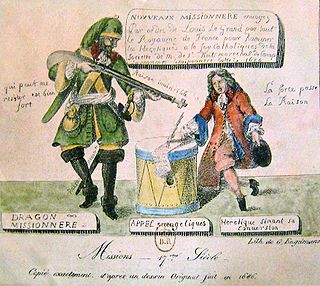
The Dragonnades were a French government policy instituted by King Louis XIV in 1681 to intimidate Huguenot (Protestant) families into converting to Catholicism. This involved the billeting of ill-disciplined dragoons in Protestant households with implied permission to abuse the inhabitants and destroy or steal their possessions. The soldiers employed in this role were satirized as "missionary dragoons".
The Great Cipher was a nomenclator cipher developed by the Rossignols, several generations of whom served the French monarchs as cryptographers. The Great Cipher was so named because of its excellence and because it was reputed to be unbreakable.

Louis Joseph de Bourbon, Duke of Vendôme, often simply called Vendôme was a French general and Marshal of France. One of the great generals of his era, he was one of Louis XIV's most successful commanders in the War of the Grand Alliance and War of the Spanish Succession.

The Battle of Staffarda, 18 August 1690, was fought during Nine Years' War in Piedmont-Savoy, modern-day northern Italy. The engagement was the first major encounter in the Italian theatre since Victor Amadeus, the Duke of Savoy, had joined the Grand Alliance in opposition to France earlier that year. The battle was a clear victory for the French commander, Nicolas Catinat, who proceeded to take other Piedmontese strongholds. The French also overran most of the Duchy of Savoy, but due to sickness, lack of infantry, and problems with supply, Catinat was unable to besiege Amadeus's capital Turin as King Louis XIV had hoped.

Antoine Court was a French reformer called the "Restorer of Protestantism in France." He was born in Villeneuve-de-Berg, in Languedoc, on 27 March 1696. His parents were peasants, adherents of the Reformed church, which was then undergoing persecution. When 17 years old, Court began to speak at the secret meetings of the Protestants, held literally "in dens and caves of the earth," and often in darkness, with no pastor present to teach or counsel.

The Ancien Régime, also known as the Old Regime, was the political and social system of the Kingdom of France from the Late Middle Ages until the French Revolution of 1789, which abolished the feudal system of the French nobility (1790) and hereditary monarchy (1792). The Valois and Bourbon dynasties ruled during the Ancien Régime. The term is occasionally used to refer to the similar feudal systems of the time elsewhere in Europe such as that of Switzerland.

The Siege of Cuneo was fought on 28 June 1691 during Nine Years' War in Piedmont-Savoy, modern-day northern Italy. The siege was part of French King Louis XIV’s campaign against Victor Amadeus, the Duke of Savoy, who had sided with the Grand Alliance the previous year. The siege was an attempt to gain a foothold on the Piedmont Plain, thus ensuring Marshal Catinat's army could winter east of the Alps. Yet due to the incompetence of the two French commanders – and a timely arrival of Imperial reinforcements – the siege proved a disaster, resulting in the loss of between 700 and 800 men. Although French forces had taken Nice in the west, and Montmélian in the north, Catinat's small, ill-equipped army was forced onto the defensive. Louis XIV subsequently offered Amadeus generous peace terms but the Duke, who had by now received substantial Imperial reinforcements from the Empire, considered himself strong enough to continue hostilities.

The Battle of Chiari was fought on 1 September 1701 during the War of the Spanish Succession. The engagement was part of Prince Eugene of Savoy's campaign to seize the Spanish controlled Duchy of Milan in the Italian peninsula, and had followed his victory over Marshal Catinat at the Battle of Carpi in July. Marshal Villeroi replaced Catinat as commander of the Franco–Spanish–Savoyard forces in the theatre, carrying with him orders from King Louis XIV to push the Imperialists out of Italy.

Élisabeth Marguerite d'Orléans, known as Isabelle d'Orléans, was the Duchess of Alençon and, during her husband's lifetime, Duchess of Angoulême. She was a daughter of Gaston d'Orléans and a first cousin of Louis XIV of France. She has no descendants today. She was suo jure Duchess of Alençon and Angoulême.

Bonne de Pons d'Heudicourt, was a French courtier, known as the royal mistress of Louis XIV of France. She was known as La Grande Louve after her spouse, who was the king's official Master of the Wolf Hunt.

Jacques de Gastigny, known in England as James Gastigny, was a French Huguenot who served as Master of the Buckhounds to King William III. Through his will he founded the French Protestant Hospital in Finsbury, London, the first voluntary hospital in England.
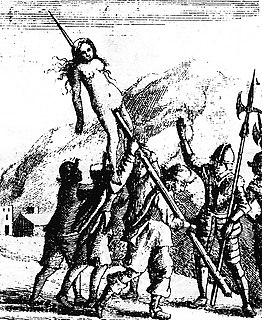
The Savoyard–Waldensian Wars were a series of conflicts between the community of Waldensians and the Savoyard troops in the Duchy of Savoy from 1655 to 1690. The Piedmontese Easter in 1655 sparked the conflict. It was largely a period of persecution of the Waldensian Church, rather than a military conflict. Joshua Janavel (1617–1690) was one of the Waldensian military leaders against the Savoyard ducal troops.

Events from the year 1681 in France


















